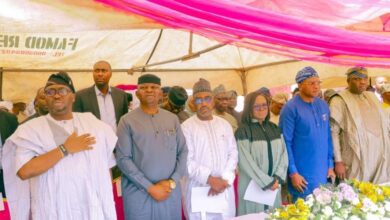
The National Human Rights Commission (NHRC) has raised concerns over the increasing push for the death penalty in Nigeria, warning that such measures could be counterproductive in addressing crime and human rights violations.
Presenting the NHRC’s February 2025 human rights dashboard, Human Rights Adviser Hillary Ogbonna noted that while the country continues to grapple with mass killings, abductions, and other violent crimes, the growing trend of prescribing capital punishment as a solution is troubling.
According to the report, February saw a surge in human rights violations, with 191 killings, 144 kidnappings, 1493 cases of child abandonment and 341 cases of rape recorded. Reports of suicide and cultism also rose, while law enforcement-related complaints remained the highest category of grievances received.
He cited the Edo State Secret Cult and Similar Prohibition Law 2025, the Anambra Homeland Security Law 2025, and the proposed death penalty for drug-related offenses by the National Agency for Food and Drug Administration and Control (NAFDAC) as examples.
“The NHRC urges authorities to rethink this approach. Ascribing the death penalty to crimes may appear to be a strong deterrent, but history and global trends have shown it to be ineffective in curbing criminal activities,” Ogbonna stated.
He argued that rather than resorting to capital punishment, the government should focus on strengthening law enforcement, ensuring fair trials, and addressing the socio-economic factors driving crime.
He also called for reforms to prevent extrajudicial killings, protect women’s rights—particularly in cases of spouse abandonment, which topped the complaints list at 6,954 cases—and improve overall human rights protections in the country.
The NHRC reiterated its stance against the death penalty, emphasizing that a rights-based approach to justice and security would yield more sustainable solutions in tackling Nigeria’s deepening human rights crisis.
Earlier in his welcome remarks, the executive secretary of the commission, Anthony Ojukwu, SAN expressed deep concern over the persistent rise in human rights violations across Nigeria, particularly those involving state actors.
Ojukwu disclosed that the commission received a staggering 205,364 complaints in February alone, underscoring the gravity of human rights challenges in the country.
He lamented that despite ongoing advocacy, security agencies continue to top the list of violators, raising serious questions about accountability in law enforcement.
“The use of power must always align with human rights standards, and any abuses must be swiftly addressed,” Ojukwu stated, urging the government to intensify efforts in holding perpetrators accountable.
Beyond state-led violations, the commission highlighted increasing concerns over economic, social, and cultural rights violations, as millions of Nigerians struggle to access basic needs such as food, healthcare, and education.
“In several parts of our country, access to these fundamental rights remains elusive. Urgent policy interventions are needed to bridge these disparities,” he added.
He said the NHRC is also examining the human rights implications of new laws recently enacted by some state governments, including the Edo State Secret Cult and Similar Activities (Prohibition) Law 2025, the Anambra Homeland Security Law 2025, and the Edo State Kidnapping Prohibition Law 2025.
These laws impose severe penalties, including the death sentence, on those involved in cultism and kidnapping.
While acknowledging the need for stringent measures to curb violent crimes, Ojukwu cautioned that justice must not come at the expense of fundamental human rights. Similarly, he raised concerns over the proposed death penalty by the National Agency for Food and Drug Administration Control (NAFDAC) for the sale of counterfeit drugs, stressing the importance of proportionality in sentencing.
“The situation in Benue and Niger calls for a swift, coordinated response from both state and federal authorities to break the cycle of violence,” Ojukwu warned.
The NHRC also expressed alarm over the surge in cult-related violence, particularly in the South-South region, where frequent clashes have left communities in fear. Ojukwu urged security agencies to act decisively in dismantling cult networks and restoring public safety.
On child rights, the commission noted a worrying rise in cases of child abandonment. In response, the NHRC has approved a new Child Safeguarding Policy to protect children who come into contact with the commission’s services.
Ojukwu commended outgoing Director of Women and Children, Mrs. Grace Pam, for championing the policy, describing it as a lasting legacy of her service.
While acknowledging the scale of the challenges, Ojukwu reiterated that the NHRC’s work does not end with compiling statistics but serves as a call to action for government authorities, civil society, and international partners.
He also addressed concerns about the use of NHRC reports by political actors, emphasizing that while state governments may react emotionally to their rankings, the dashboard serves as a tool for self-assessment and reform.
“The dashboard is not an attack on any state but a starting point for dialogue and solutions,” he clarified.
The NHRC expressed appreciation to partners, including the United Nations Development Programme (UNDP) and the Office of the High Commissioner for Human Rights (OHCHR), for their continued support in advancing human rights in Nigeria.






